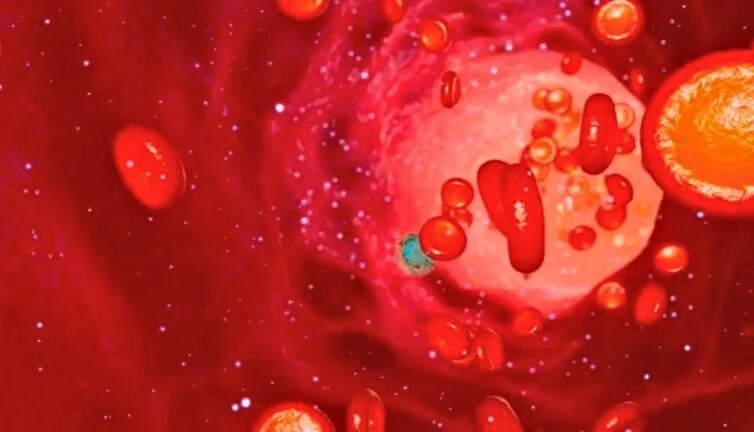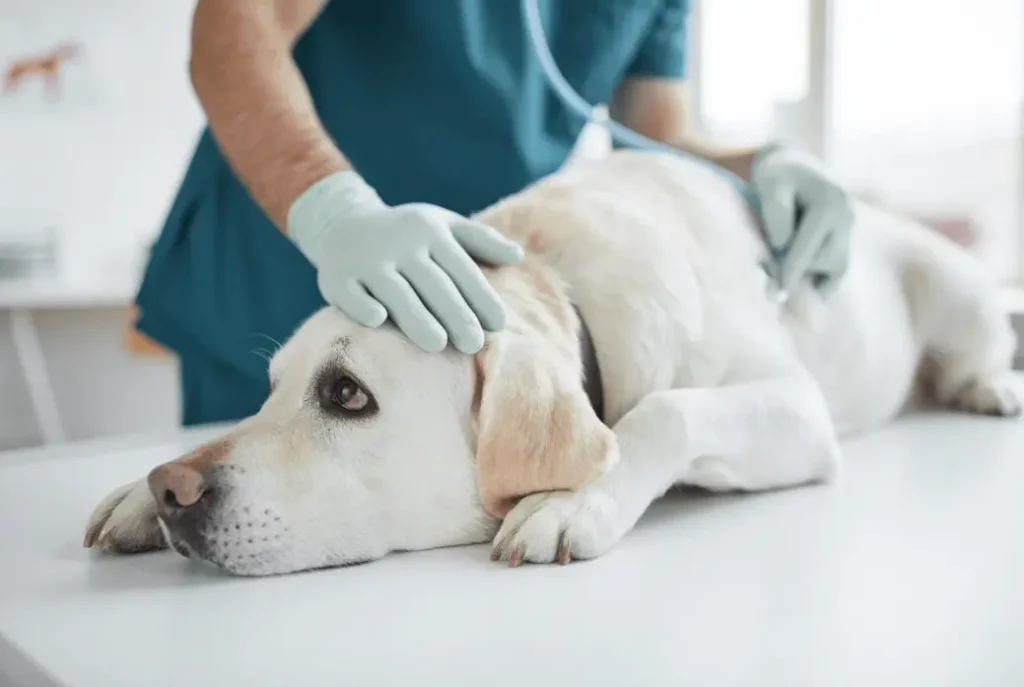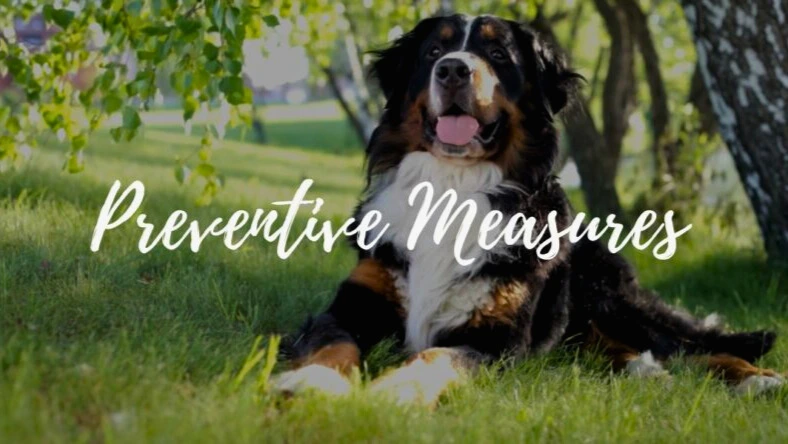Seeing your dog panting and having diarrhea can be worrying. As a pet owner, you want to get to the bottom of what’s causing your best friend distress.
In this article, we’ll explore the potential reasons behind panting and diarrhea in dogs and what you can do to help your pup feel better.
What Does Panting and Diarrhea Indicate?
Panting and diarrhea occurring together can indicate an underlying health issue for your dog. Here are some key points:
- Panting is rapid, shallow breathing and is one way dogs cool themselves when they’re hot or stressed. However, it can also signal pain, discomfort, nausea, or anxiety.
- Diarrhea is loose, watery stools rather than solid ones. It’s usually a sign of some kind of digestive upset or inflammation.
- When these two symptoms appear together, it suggests your dog may have an issue affecting their digestive system and/or overall health.
- Some common causes include infections, parasites, food allergies, pancreatitis, and other conditions affecting the stomach, intestines, liver or kidneys.
- Dehydration is also a risk with diarrhea, and this can make your dog pant more as well. Serious cases require prompt veterinary attention.
What Can Cause This?
There are many possible reasons your dog may be panting and having diarrhea at the same time. Here are some of the most common culprits:
Dietary Indiscretion or Food Allergy
If your dog got into the trash or spoiled food, ate table scraps, or stole food off the counter, this dietary indiscretion could cause both panting and diarrhea. Their digestive system is upset from getting something they shouldn’t have.
Food allergies or intolerances can also manifest this way. For example, some dogs are allergic to ingredients like wheat, chicken, or dairy.
Parasites
Intestinal parasites like roundworms, hookworms, whipworms or giardia can disrupt normal digestion, damage the gut lining, and prevent proper nutrient absorption. This leads to diarrhea along with possible vomiting, appetite changes, and lethargy.
Bacteria or Viruses
Bacterial infections like salmonella or campylobacter can cause acute vomiting and diarrhea. Viral infections like parvovirus often produce severe bloody diarrhea along with fever, lethargy, and dehydration. All of these can make your dog very ill and lead to panting as well.
Pancreatitis

The pancreas helps digest food, and pancreatitis is when the pancreas becomes inflamed. This is very painful and causes nausea, loss of appetite, vomiting and diarrhea. Dogs may pant from the discomfort.
Inflammatory Bowel Disease (IBD)
IBD involves chronic inflammation of the digestive tract. It can lead to diarrhea, vomiting, weight loss, and poor nutrient absorption over time. This disease can also cause tummy pain that makes your dog pant.
Stress or Anxiety
Dogs under stress may pant excessively and sometimes get diarrhea too. New environments, loud noises, travel, or changes in routine can be stressful. Separation anxiety when left alone is another common cause.
Medications or Toxins
Certain medications like NSAIDs or chemotherapy drugs can irritate the digestive tract, as can ingest toxins like antifreeze, pesticides, or toxic plants. Both can cause vomiting, diarrhea, and other symptoms.
See also: Why Is My Dog’s Skin Pink?
Liver or Kidney Disease
If your dog has an underlying kidney or liver problem, this can disrupt normal digestion and lead to gastrointestinal signs. Serious diseases can also cause nausea, pain, or dehydration, which makes your dog pant more.
Hyperthyroidism or Cushing’s Disease
An overactive thyroid (hyperthyroidism) and Cushing’s disease both produce excessive panting in dogs along with increased thirst, appetite, and urination. Diarrhea can also occur with Cushing’s.
Heat Stroke
When dogs get dangerously overheated, heat stroke can result. This causes heavy rapid breathing, elevated body temperature, diarrhea, vomiting, disorientation and other alarming signs requiring emergency treatment.
Blockages or Obstructions
Swallowing foreign objects, tumors, or intestinal twisting can partly or fully block the intestines. This is very painful and results in vomiting, diarrhea, appetite loss and lethargy. It’s a surgical emergency.
As you can see, many conditions can cause panting and diarrhea in dogs, ranging from mild to extremely serious. If you notice these symptoms, don’t ignore them. Get your dog checked by a vet. Prompt treatment greatly improves the outlook for many of these conditions.
What to Do If Your Dog Has Diarrhea and Is Panting
If your dog has diarrhea and is panting, here are some important things to do:
- Contact your vet – Let them know what symptoms you’re seeing and make an appointment. For severe diarrhea with vomiting, lethargy, or other concerning signs, seek emergency vet care.
- Withhold food initially – Give their GI tract a rest for 6-12 hours, but provide small amounts of water. Then try a bland diet of rice and boiled chicken.
- Prevent dehydration – Make sure your dog gets lots of water to replenish what’s lost in diarrhea. Watch for tacky or dry gums.
- Limit activity – Keep your dog quiet and calm to allow their body to rest and recover. Take short leashed walks only.
- Monitor closely – Check for worsening diarrhea or vomiting, weakness, loss of appetite, blood in stools, or straining. These require prompt vet attention.
- Bring a stool sample – Collect a fresh sample and bring it to the vet appointment. They can test it for parasites and infections.
- Avoid self-treatment – Don’t give over the counter medications without your vet’s guidance, as these could make diarrhea worse or have harmful interactions.
With supportive care at home and treatment from your vet, most cases of panting and diarrhea can be successfully managed. Call your vet right away if symptoms don’t improve within 1-2 days.
What Diagnostic Tests and Treatments Could My Vet Recommend?

To determine the cause of your dog’s panting and diarrhea, the vet will begin with a physical exam, gathering a history of your dog’s symptoms and health. They’ll check temperature, heartbeat, breathing and press on the abdomen to check for pain, masses, or enlarged organs.
Initial testing may include:
- Complete blood count (CBC) – Checks for anemia, infection, inflammation, dehydration, and electrolyte levels
- Biochemistry panel – Assesses kidney, liver, pancreatic, and electrolyte function
- Urinalysis – Helps evaluate kidney function and look for UTI, crystals, or glucose in urine
- Fecal tests – Check for intestinal parasites and overgrowths of bacteria or yeast
Based on initial findings, the vet may recommend:
- Imaging – Abdominal ultrasound, x-rays, or CT scan to visualize the GI tract, pancreas, liver and other organs
- Endoscopy – A scope inserted into the mouth or rectum to examine the esophagus, stomach, and upper intestine
- Biopsies – Small tissue samples examined microscopically to identify inflammatory bowel disease, cancer, etc.
- Special blood tests – Such as cPL or PLI to help diagnose pancreatitis; TLI to screen for EPI (maldigestion)
Treatment will depend on the specific cause but may include:
- IV fluids – Given for dehydration and electrolyte imbalances
- Anti-nausea medication – Helps control vomiting and restore appetite
- Special diet – Highly digestible, low fat prescription food for GI issues
- Antibiotics – Used for bacterial infections and inflammatory bowel disease
- Anti-parasite medication – Treats intestinal worms, giardia, coccidia, etc.
- Pancreatic enzymes – Aid digestion for dogs with EPI or pancreatitis
- Immunosuppressants – For inflammatory bowel disease and autoimmune disorders
- Surgery – May be needed for bowel obstructions, foreign bodies, large tumors, etc.
- Medication adjustment – If drugs are causing GI side effects
With prompt veterinary attention and appropriate treatment, the outlook for dogs with panting and diarrhea is very good in the majority of cases. Stay in close contact with your vet during the treatment process.
Let them know right away if symptoms worsen or persist despite treatment. With your vet guiding the way, your dog will likely make a full recovery and be back to their happy, playful selves in no time.
How Can I Help Prevent This in the Future?
Here are some good tips to help keep your dog happy and healthy and avoid issues like diarrhea and panting:
- Give a high quality diet suited for your dog’s age and health status. Follow feeding guidelines carefully.
- Provide plenty of clean, fresh water – Hydration is very important!
- Don’t overfeed treats – Excess treats and table scraps can upset the tummy.
- Keep your dog at a healthy weight to avoid obesity-related conditions.
- Ensure regular exercise – Daily walks and play help keep your dog fit.
- Give supplements if needed – Such as probiotics, fiber, and fish oil. Discuss with your vet.
- Stay up to date on vaccines, deworming, and preventatives – Ask your vet for advice specific to your dog’s needs.
- Keep your dog stress-free – Make sure they get enrichment attention and feel secure. Watch for separation anxiety.
- Puppy-proof your home – Prevent access to unsafe foods and objects to avoid dietary indiscretion.
- Learn the signs of illness – Vomiting, diarrhea, lethargy, appetite changes – call your vet promptly if you notice anything off.
With excellent nutrition, low stress, plenty of love and attention, and good preventive health care, you and your vet can work together to keep your dog happy and healthy and reduce the risk of scary symptoms like diarrhea and panting. Stay alert for any signs of trouble, and you’ll be able to get your pup the care they need.
Frequently Asked Questions
Why is my dog panting and restless at night?
Discomfort or pain from digestive issues, musculoskeletal problems, allergies or other medical conditions can cause panting and restlessness in dogs. Discuss your dog’s symptoms with your vet.
Are panting and diarrhea signs of something serious?
They can potentially indicate serious illness like kidney failure, liver disease, pancreatitis, parvovirus and others. Don’t delay – call your vet promptly if you notice panting and diarrhea.
How can I stop the diarrhea?
For mild cases, withhold food briefly then transition to a bland diet. Make sure your dog stays hydrated. For severe diarrhea, see your vet for prescribed anti-diarrheal medication and treatments. Don’t give human anti-diarrheal medicines to your dog without asking your vet first.
Why does my dog keep throwing up and panting?
Persistent vomiting with panting can signify pancreatitis, intestinal blockage or torsion, poisoning or other dangerous conditions requiring emergency vet care. Don’t hesitate – get your dog seen right away.
When do dogs pant vs. sweat?
Dogs primarily pant to cool themselves. They have few sweat glands, mainly on their paws and noses. Panting evaporates moisture from the mouth and throat, cooling the blood before it circulates through the body. Dogs will pant much more readily than humans will sweat.
Is diarrhea common in older dogs?
Yes, diarrhea is fairly common in senior dogs. Age-related causes include impaired kidney or liver function, pancreatic insufficiency, inflammatory bowel disease, intestinal tumors, and side effects of medications. Have an older dog with diarrhea evaluated promptly.
Can dog panting be related to emotions?
Yes, dogs may pant when excited, anxious, or fearful. If your dog pants during car rides, separation, or when exposed to noises or strangers, it’s likely a sign of stress. Consult a vet to rule out medical issues first, then consider behavioral therapy techniques to help.
The Takeaway on Diarrhea and Panting in Dogs
Diarrhea and panting occurring concurrently can signal a problem with your dog’s health and comfort. While it may resolve with simple care at home, it’s essential to contact your vet, as prompt treatment is needed for many potential underlying illnesses. Thanks to amazing veterinary care, most dogs with panting and diarrhea recover fully with appropriate therapy. Know the symptoms, respond quickly, and work closely with your vet – together you can keep your beloved dog healthy and happy.
“The biggest concern is dehydration. Make sure your dog gets adequate fluids.” – Dr. Amanda Landis, DVM
Read More:


